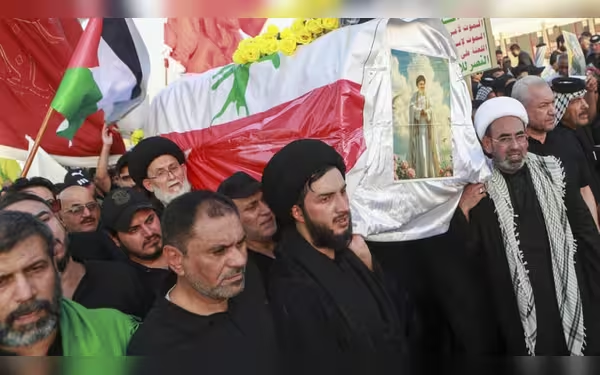Sunday, October 6, 2024 02:41 AM
Hezbollah's Leadership Crisis Amid Ongoing Israel Conflict
- Hezbollah formed in response to Israeli invasion of Lebanon.
- Hassan Nasrallah's death escalates tensions with Israel.
- Conflict impacts regional stability and international relations.
 Image Credits: channelnewsasia
Image Credits: channelnewsasiaThe death of Hezbollah's leader escalates the long-standing conflict with Israel, impacting regional stability and international relations.
For decades, the conflict between Israel and Hezbollah has been a significant issue in the Middle East. This rivalry has deep roots, tracing back to the early 1980s when Israel invaded Lebanon. The invasion led to the emergence of Hezbollah, which means "Party of God" in Arabic. This group was formed with the support of Iran's Revolutionary Guards Corps, aiming to resist Israeli presence in Lebanon.
Hezbollah officially came into the spotlight in 1985 when it established its armed wing known as the Islamic Resistance in Lebanon. This group became the frontline force in the struggle against Israel. Over the years, Hezbollah has been involved in various military operations, including suicide car bombings and human wave attacks, particularly targeting Israeli forces and their allies, such as the South Lebanon Army (SLA), which is primarily composed of Christian militia members.
The conflict has not only been about military engagements but also about ideology and power. Hezbollah views itself as a defender of Lebanon against Israeli aggression, while Israel sees Hezbollah as a terrorist organization that threatens its security. This ongoing tension has led to numerous confrontations, resulting in significant loss of life and widespread destruction.
In recent developments, the death of Hezbollah's leader, Hassan Nasrallah, in an Israeli airstrike has escalated the situation further. His leadership was pivotal in shaping Hezbollah's strategies and its role in the region. The loss of such a prominent figure raises questions about the future of Hezbollah and its ongoing conflict with Israel.
Understanding the complexities of this conflict is crucial for grasping the broader dynamics of the Middle East. The rivalry between Israel and Hezbollah is not just a local issue; it has implications for regional stability and international relations. As the situation continues to evolve, it is essential for observers to stay informed about the developments in this long-standing conflict, as it remains a critical factor in the geopolitics of the region.













